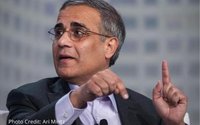Tobaccowala: Why Is The Industry So Insecure?
- by Larissa Faw , March 23, 2016

Ad fraud, ad blocking, sexism, transparency concerns. It may seem like the ad industry is in turmoil, but if the business is so troubled, why are so many people coming into it? That question was posed by Publicis Groupe's Rishad Tobaccowala during a Wednesday morning session on the future of advertising at 4As Transformation Conference in Miami.
It was a rhetorical question that Tobaccowala answered this way: "It is because it is a growth industry. We need to stop being so insecure. And our clients need to stop being so insecure."
Tobaccowala was joined by Annalect's Scott Hagedorn and GroupM's Rob Norman on a panel moderated by Financial Times' Matthew Garrahan to discuss the future of the industry and what to do about a generation that seems intent on avoiding advertising.
Agencies thrive on change, says Hegedorn. "We are not encumbered by the past and we are able to adapt quickly. Interesting time to think of branding where brands can become less one-dimensional."
advertisement
advertisement
Yet transformation may not be as radical as commonly perceived, says Tobaccowala. "The real impact of what we are seeing today happened 10 years ago."
In 2007, two key events occurred that would help to radically transform consumer communications: Apple came out with a smartphone and Facebook transitioned from desktop to mobile. And now, says Tobaccowala, "you are seeing the impact."
Everyone is connected to everything, but "human beings don't deal with too much change." "Interactions are better, but more isn't necessarily better." Tobaccowala likens ad targeting to throwing a bunch of spears. "It will kill them to send all of these messages."
Millennials are more brand-conscious than anybody, but brands can’t just rely on traditional ads, says Tobaccowala. "You can give them a great experience [as opposed to simply selling them something]." He adds that advertising isn't only about sending messages to people." There are two parts: plumbing and poetry. Both need to work collaborating in order to be effective.”
The constant chatter about the death of TV may also be overstated. Just look at Trump, says Tobaccowala. He was built by TV. And then when competitors went on TV to attack him, it boosted his popularity. Plus, "TV is video and people are spending more time on video than ever before." The only real shift is an abundance of riches in terms of channel options where you once had "four colors but now have 15 colors, but why is it a bad thing?" he asks.
Yet although people actually love to watch video, they don't love to watch forced views, says Norman. "There are more formats than ever before, but we are taking liberties with patience and attention." The industry made mistakes in ad load with content and amount of data cost, he says. The industry was clumsy with tracking, and there is clear demand to better organize inventory. "There is demand on advertisers and agencies to create value not irritation," says Norman.
Another problem is that over the past 10 years the pendulum swung to marketers feeling a need to drive more efficiency rather than focusing on just effectiveness and thus “divorced effectiveness from marketing,” says Hagedorn. This is what is driving ad blocking, but he predicts it will flip back to its previous pattern in the near future.
"It is clear the sophisticated has gotten ahead of the granular part of the business," says Norman. He says that the industry needs to rethink commonly held assumptions, such as the ideal length of ads. "It may be time to take the zero out of the 30-second video and create new narratives that can be assembled out of fragments."
The industry is in an unprecedented position to be at the forefront of a fractured world and be able to put it back together again to define what the brand and experience is about, they say. "We have a front row seat for the disrupters and disruption," says Norman.


